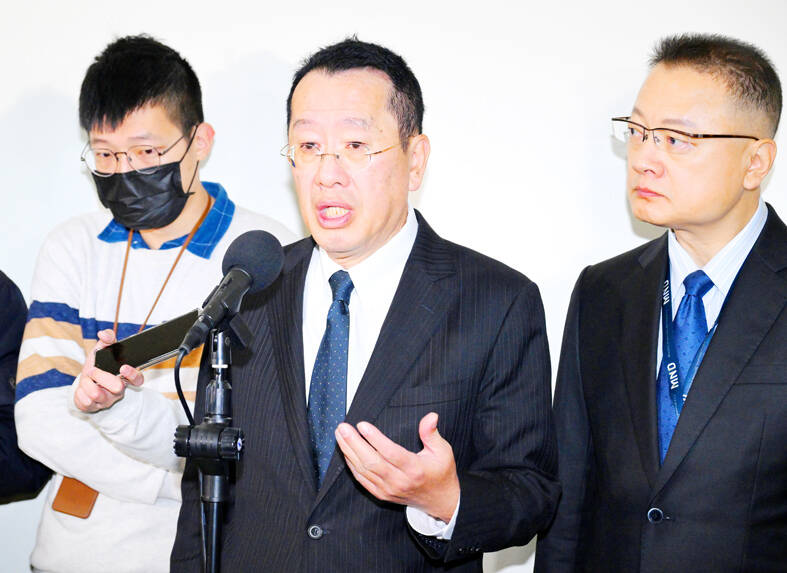A US academic’s recent call for greater transparency in reporting China’s military incursions into Taiwan’s air defense identification zone (ADIZ) presents a difficult choice, Minister of National Defense Wellington Koo (顧立雄) said yesterday.
“This is a dilemma for us,” Koo told reporters on the sidelines of a legislative meeting in Taipei in response to the criticism.
The Ministry of National Defense (MND) wants to make information more transparent, but there are also risks to doing that, Koo said.

Photo: Liao Cheng-hui, Taipei Times
If the MND disclosed too much information based on the results of its surveillance of Chinese People’s Liberation Army (PLA) forces, it could expose Taiwan’s intelligence and reconnaissance capabilities, and the potential sources of its information-gathering process, Koo said.
However, Koo pledged that the military would continue to regularly review the information it releases on PLA incursions to make it more transparent, while at the same time not disclosing its sources of intelligence during the process to protect national security.
Koo was responding to questions about criticisms of Taiwan’s military expressed by Thomas Shattuck, a special project manager at the University of Pennsylvania’s Perry World House policy research center, in a recent interview with the Central News Agency (CNA).
The MND has made frequent, unexplained changes in its public reporting of Chinese military activity in recent years, undermining the campaign’s effectiveness, Stattuck said.
There have also been inconsistencies between the Chinese and English-language versions of the reports, and changes — such as starting, and then halting, reporting of Chinese balloons — have been made without explanation or any clear logic, he said.
Shattuck said that the MND has a difficult task, but added that by sharing less and abruptly changing what it divulges, Taiwan risked making it seem as if the threat was “not as significant,” causing people in Taiwan and the US to care less, he said.
The MND has released a daily “real-time military update” documenting PLA incursions into Taiwan’s ADIZ since September 2020 to inform people at home and abroad of the increasing Chinese military threat.
An ADIZ is a self-declared area where a country claims the right to identify, locate and control approaching foreign aircraft, but is not part of its territorial airspace as defined by international law.
Separately, if the national defense budget for the domestic Hai Kun (海鯤) submarine construction project is cut next year, the earliest that funding for the program could be allocated is 2026, with implementation delayed until 2027, Koo said.
The Legislative Yuan’s Foreign and National Defense Committee is to continue reviewing next year’s national defense budget today, including the submarine construction project under the Indigenous Defense Submarine Program.
This program has a total proposed cost exceeding NT$284 billion (US$8.74 billion), with NT$1.9 billion to be allocated next year.
However, Chinese Nationalist Party (KMT) legislators Ma Wen-chun (馬文君), Huang Jen (黃仁) and Hsu Chiao-hsin (徐巧芯) have proposed cutting the submarine budget.
The MND has been communicating with the legislators and has assured them that the budget would not be used until the prototype submarine passes its sea trials, Koo said.
If the budget does not pass, not only would the timeline be delayed, but subcontractors would question Taiwan’s commitment to constructing the submarine, Koo said.
Additional reporting Wu Che-yu and Sam Garcia

Japanese footwear brand Onitsuka Tiger today issued a public apology and said it has suspended an employee amid allegations that the staff member discriminated against a Vietnamese customer at its Taipei 101 store. Posting on the social media platform Threads yesterday, a user said that an employee at the store said that “those shoes are very expensive” when her friend, who is a migrant worker from Vietnam, asked for assistance. The employee then ignored her until she asked again, to which she replied: "We don't have a size 37." The post had amassed nearly 26,000 likes and 916 comments as of this

US President Donald Trump said "it’s up to" Chinese President Xi Jinping (習近平) what China does on Taiwan, but that he would be "very unhappy" with a change in the "status quo," the New York Times said in an interview published yesterday. Xi "considers it to be a part of China, and that’s up to him what he’s going to be doing," Trump told the newspaper on Wednesday. "But I’ve expressed to him that I would be very unhappy if he did that, and I don’t think he’ll do that," he added. "I hope he doesn’t do that." Trump made the comments in

Tourism in Kenting fell to a historic low for the second consecutive year last year, impacting hotels and other local businesses that rely on a steady stream of domestic tourists, the latest data showed. A total of 2.139 million tourists visited Kenting last year, down slightly from 2.14 million in 2024, the data showed. The number of tourists who visited the national park on the Hengchun Peninsula peaked in 2015 at 8.37 million people. That number has been below 2.2 million for two years, although there was a spike in October last year due to multiple long weekends. The occupancy rate for hotels

A cold surge advisory was today issued for 18 cities and counties across Taiwan, with temperatures of below 10°C forecast during the day and into tonight, the Central Weather Administration (CWA) said. New Taipei City, Taipei, Taoyuan and Hsinchu, Miaoli and Yilan counties are expected to experience sustained temperatures of 10°C or lower, the CWA said. Temperatures are likely to temporarily drop below 10°C in most other areas, except Taitung, Pingtung, Penghu and Lienchiang (Matsu) counties, CWA data showed. The cold weather is being caused by a strong continental cold air mass, combined with radiative cooling, a process in which heat escapes from